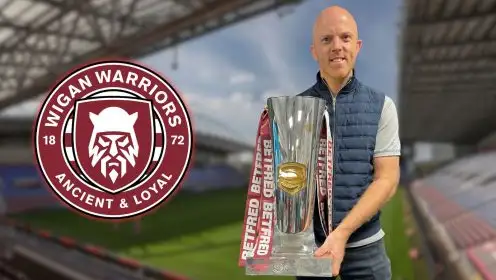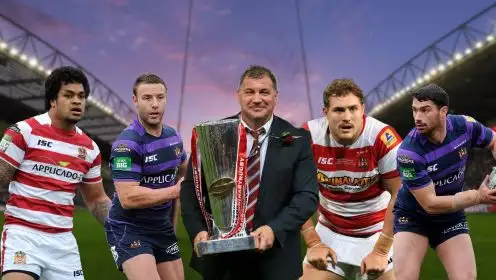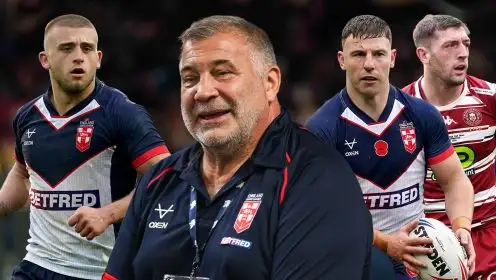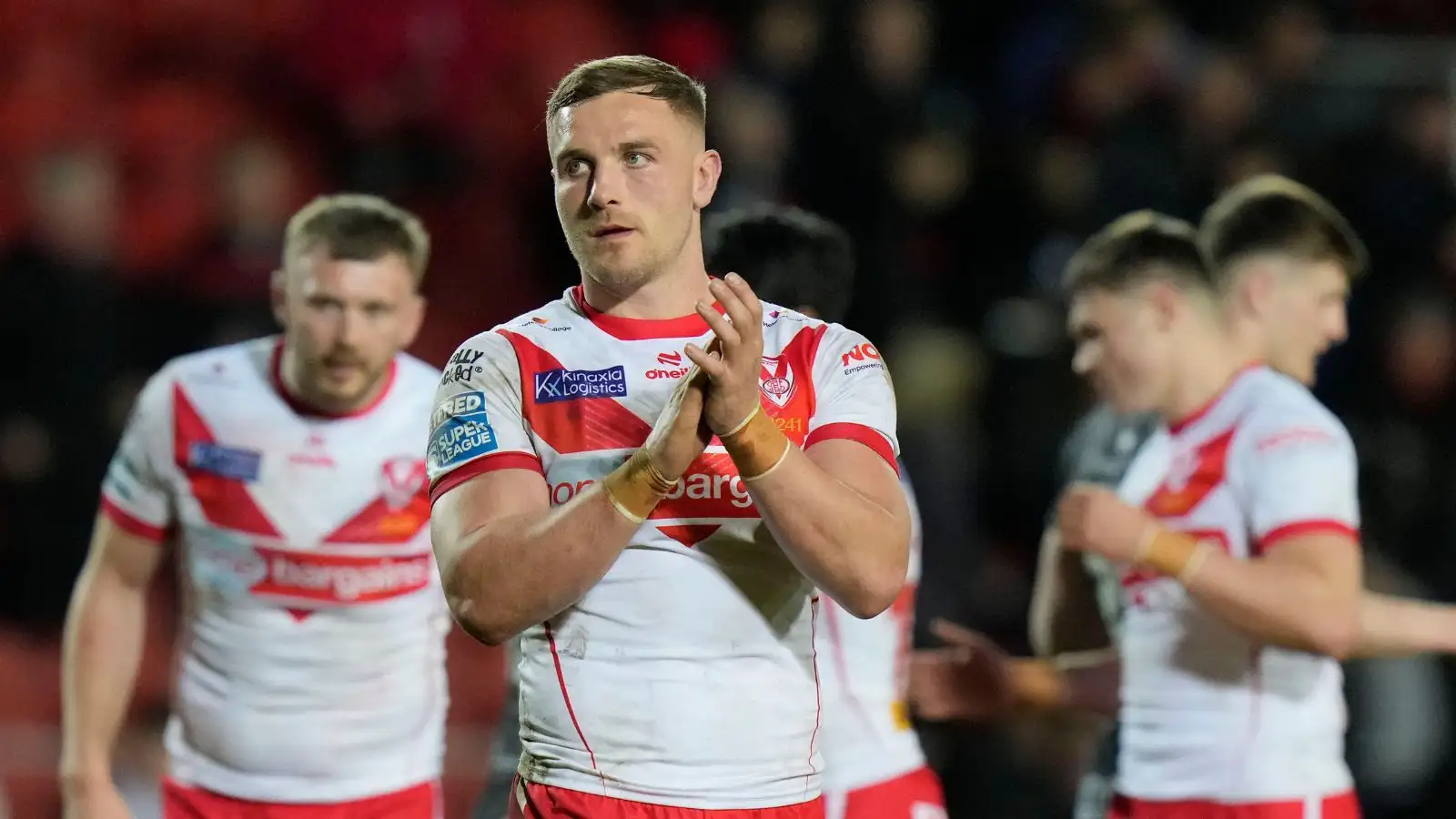What can Shaun Wane’s England learn from Gareth Southgate and Brendon McCullum to beat Australia?
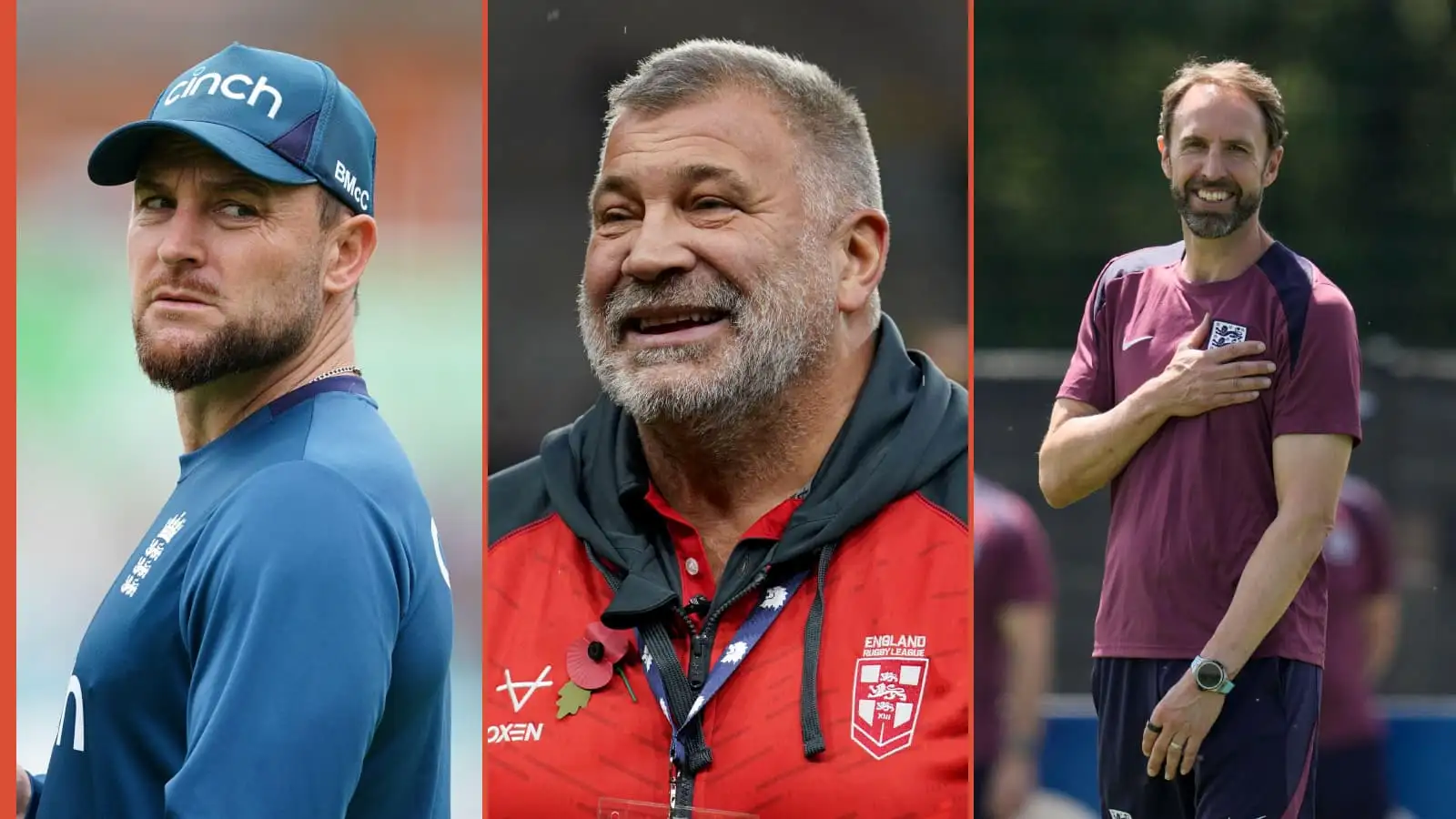
Wednesday stands as one of the biggest sporting days of the year in England.
At 11am, England’s cricket team start their home summer at Lords against the West Indies, ushering out a legend in James Anderson and bringing through the second generation team under coach Brendon McCullum, aimed at the peak of the next cycle, an away Ashes at the end of 2025.
Then, nine hours later and 600km away in Dortmund, Gareth Southgate will take charge for the 101st and potentially final time as the Three Lions take on the Netherlands for a spot in the final of Euro 2024.
It’ll be a defining day for both Gazball and Bazball – though, by this point, you’re probably wondering why this is appearing on a website dedicated to rugby league.
Our sport could only long for the national exposure those two will get given the recent French fiasco (while we’re there, Tom Pidcock or Adam Yates might fancy a crack at Stage 11 of Le Tour) and Shaun Wane, though a great coach with his own distinctive style, is miles off the national exposure of either Southgate or McCullum.
What is interesting about the two conflicting styles, in light of both Wane’s England and rugby league in general, is how they approach a fundamental aspect of coaching across all team sports: talent.
More specifically, the way that both systems deal with talent distribution or if you prefer, talent discrepancy.
READ NEXT: ‘Embarrassing, like Academy game’: England icons, Super League coaches’ scathing reaction to Test
We’re told that coaches are only as good as their cattle, but the vastly differing methods of arranging players to get the maximum from what they have is telling, and there are rugby league lessons in there.
Whatever you think of Bazball – and we can guess that an English reader enjoys it, an Australian one thinks its annoying – it has undoubtedly improved the England Test side, who won three times in 18 matches prior to McCullum and Ben Stokes taking charge and 13 times in the next 18.
For all the bluster about saving Test cricket, for all the (frankly) rubbish about moral victories, the legacy so far is that it is a style of play that has optimised the talent available to England over the last three years.
They played Test cricket like a 50-over team, a format in which they were world champions, using aggression early on to force the opposition to change their plans before dinking ones and twos like the so-called boring middle overs. Remember, in the 2023 Ashes, Australia actually hit more boundaries.
Guys like Zak Crawley and Ben Duckett, who were excellent white ball players and middling red ball players became the best opening partnership in over a decade almost overnight, not because they got better but because they played how they played in one-day cricket.
When the talent limitations were reached in India – a lack of experienced spinners most obviously – the team began to lose again, but still probably did better than they would have done had they been also batting ‘sensibly’.
Compare and contrast with the England football team, who have the opposite problem yet, sort of, the same results.
They have an abundance of talent, more than perhaps at any other juncture in the last two decades if not longer, but play with no discernible style in possession.
Yet they, too, are as successful as they have been with three major tournament semis in four attempts. What Southgate has done to achieve that is also about talent distribution.
Former Liverpool manager Rafa Benitez described football tactics as like trying to sleep under a blanket that wasn’t quite long enough – you had to pick whether your feet or head would be exposed.
Southgate, with a better attackers than he has defenders, tries to use tactics which limit opposition chances and entrusts his most talented players to then win him the game.
He’s also well aware that the central factors in making that happen are enabling discretionary effort – aka the extra 1% plays you get when your players absolutely believe in the culture and the project – and promoting confidence, a tough ask in the pressure cooker of a major tournament, but essentially to giving your best players the chance to take their chance when it comes.
It’s not pretty, but France have an even better record than England doing exactly the same thing and Southgate clearly saw that and liked the look of it.
He takes the slings and arrows, as Didier Deschamps does for Les Blues, and It is hard to argue with the results.
Rugby league is filled with these types of decisions, especially at club level. In the NRL, we have two ultimate system sides right now.
There’s the three-time Penrith Panthers using a tactical system that moves everyone to their style of game, which they invariably win.
READ NEXT: England v France to continue in 2025 with new venue suggested as bosses address controversy
Yes, they have Nathan Cleary and Isaah Yeo, arguably the two smartest players in the game, but they have also been able to shed talent constantly and have the system pick up the slack.
That’s what great tactics can do, but also great culture as anyone who has seen Ivan Cleay at work will attest.
The Panthers club is set up to build discretionary effort from top to bottom, whether that is Pasifika wellbeing officers to junior development to post-match prayer circles.
We also have the Melbourne Storm, who are more Southgatean (or maybe he’s a Craig Bellamyite) in that they build a collective that empowers their elite game changers.
There’s a reason they throw a big chunk of their salary cap at just four players and then backfill every other position with solid tacklers who can follow instructions.
Every new signing sees a building site before they see the training ground to learn the meaning of hard work and, when they need a guy out of second grade to fill in, no club is better at finding one.
Defence keeps you in the contest so that one of Cam Munster, Jahrome Hughes or Harry Grant can go win it. Jude Bellingham would approve.
In the Super League, where talent is far less evenly distributed, certain clubs hope that their best players win them games while others, often those without the best players, compensate in other ways.
When you get a talent-strong team with a good system to match, you dominate, as Wigan do now and St Helens did before.
Their systems proved so robust that they could defeat the dynastic Panthers despite their relative talent disparities, at least on one-off occasions.
It’s not just the best of the best, however.
READ NEXT: Barry Hearn hails ‘breakthrough moment’ for rugby league as celebrities endorse Las Vegas trip
Cronulla have finished second, sixth and are currently fourth with a side featuring barely anyone who plays State of Origin thanks to Craig Fitzgibbon’s small-ball, high support style of attack.
They’re compensating for a roster they don’t have with systemic success – and though admittedly, that looks a bit flimsy at the moment given their poor form, the record over the longer term suggests repeated, sustainable success.
Canterbury are sitting fifth with only one Origin player, captain Stephen Crichton, having remodelled their defence around line speed.
They perhaps lack the elite talent to win the NRL, but coach Cameron Ciraldo has build a platform that wrings the last drop out of the guys that they do have.
Salford do it all the time, as do Hull KR, and at various points Hull FC under Lee Radford, Castleford under Daryl Powell and Leigh under Adrian Lam have too.
Rugby league, on both sides of the world, enacts a salary cap that makes it difficult to have a good player in every position and forces sides to, as Rafa would have it, move their blanket accordingly.
Not every roster is created equally, but – you’d hope at least – it is created deliberately and the coach lives or dies based on the politics of the possible.
Pep Guardiola can sign the perfect player to fit his philosophy, but Ivan Cleary and Paul Rowley have to be a little more malleable.
So where does this leave Shaun Wane and England?
Waneball absolutely exists, as anyone who saw his Wigan can attest, but given the lack of contact time with players and paucity of opposition, he can only do so much.
McCullum has his team for 16 Tests in 2024, including three tours and two months straight at home in the summer, while Southgate got five international breaks, around 35 days total, in a non-tournament year like 2023.
Wane gets four weeks, one in the middle of a Super League season to play France and three at the end for a series, last year again Tonga and this coming year against Samoa.
VIVA LAS VEGAS: Inside the Deal: How Wigan Warriors secured Super League’s historic trip
Even then, he missed the midseason Test following surgery, as did all of his Australian-based players, and England won’t see any action until October.
England’s rugby league team faces a talent disparity to Australia and has to think outside of the box to overcome it.
That might be in getting more of their talent to play in the NRL in the first place – the Pommy contingent grows every year – but that comes fraught with hand-wringing about the health of Super League, even though it would probably make England better.
What he might ask in the meantime for is something akin to the ‘Club England’ mentality that Southgate built.
In that, cliques from the Premier League were put aside to focus on England when in England camp, something that Wane undoubtedly can try to emulate.
The 2017 World Cup squad under Wayne Bennett, as countless podcast interviews with ex-players has revealed, did not lack for discretionary effort, which was built through a long tour and arduous team-building.
Wane could also demand more fixtures, even if they weren’t against the best opposition, to get the maximum out of his side.
International windows in rugby league are at the whim of the NRL schedulers, but arranging to play Wales and Ireland – or just a two-game series with France – is well within the purview of England.
As much as they lament not facing the Kangaroos – they haven’t since the 2017 World Cup final – they themselves haven’t played Ireland since 2013 or Wales since 2012.
It’s not the opposition that matters, by the way, it’s the time the England players spend with each other. The training will be tougher than the game, but that won’t actually matter.
Contact time, time spent on a system, a system that is then honed over years, with a goal. Bazball would appreciate it. Gazball might too. Shaun Wane would dream of having that chance.
READ NEXT: Where are they now? The England team from the historic Denver Test in 2019
